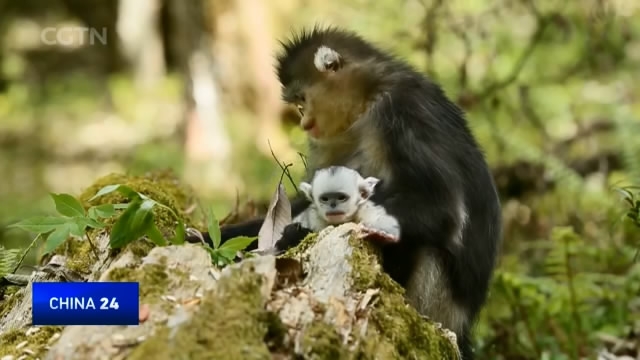
21:29, 22-May-2018
Int'l Biological Diversity Day: Scientists take measures to protect endangered species
02:11

Tuesday is International Biological Diversity Day. And this year's theme is "celebrating 25 years of action for biodiversity". It was chosen to mark the 25th anniversary of the implementation of the Convention on Biological Diversity. In China's southwestern province of Yunnan, scientists are taking measures to protect the endangered species in the region. Wang Qiwei has the story.
These wild animals enjoy having fun on top of trees. They are known as Phayre's leaf monkeys, a species that only exists in Asian countries. However, their habitats are threatened by human activity, leading to a decline in their numbers. Usually, they gather in small groups, but about 200 of them were discovered in the wild last year in China's Yunnan Province. It has caught the attention of the local research team. Scientists are now analysing the information they got to better protect the endangered species.
ZHOU CHENGWEI FORESTRY BUREAU OF MANGSHI, YUNNAN "After our field surveys and planning, we are taking measures such as patrolling in the forest and training our personnel, so that we can protect these monkeys and help to keep the biodiversity in the region."
Biodiversity is not only about the protection of animals, but also plants. These trees are called Magnolia sinica, a critically endangered species in the world. There were only nine of them in China when they were first discovered in the last century. In 2010, scientists planted 200 of these trees in Yunnan Province. And three-quarters of them have survived.
ZHOU YUAN, SENIOR ENGINEER KUNMING INSTITUTE OF BOTANY, CAS "After the planting of these trees, they have kept a good momentum of growth and adapted to the local environment. So we could say the cultivation has reached its goals."
The province of Yunnan is a mountainous region that hosts impressive biodiversity. It accounts for just four percent of China's land area, but the province is home to half of the country's natural species. With the efforts of both scientists and the local government, Yunnan is set to embrace and preserve its biodiversity. Wang QiweiWQW, CGTN.

SITEMAP
Copyright © 2018 CGTN. Beijing ICP prepared NO.16065310-3
Copyright © 2018 CGTN. Beijing ICP prepared NO.16065310-3